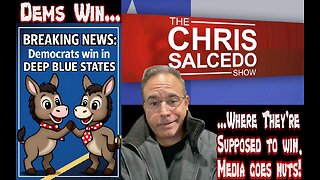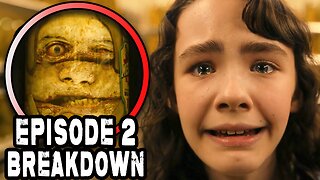Premium Only Content

Principles of Economics by Carl Menger Chapter 5.1 - Price Formation in Isolated Exchange
You want to read the book? Get it here: https://amzn.to/4cCPIQs
Watch the next video in this series: https://rumble.com/v6u8ffn-principles-of-economics-by-carl-menger-chapter-5.2a-price-formation-in-mono.html
Watch the video series from the start: https://rumble.com/playlists/I48mBTB4w2c
Watch our video about Carl Menger: https://rumble.com/v61z0l2-carl-menger-the-father-of-austrian-economics-and-subjective-value.html
How does price actually form when two people trade with each other? In this video, we explore Carl Menger’s Principles of Economics, Chapter 5.1: Price Formation in Isolated Exchange.
Menger walks us through a simple but powerful example: one person has grain, the other has wine. Each values what they own less than what the other person has—but not by the same amount. That difference in personal valuation creates a range of possible prices, with a clear upper and lower limit.
Let’s say A won’t give more than 100 units of grain for 40 units of wine. And B won’t accept less than 80 units of grain in return. A trade can happen, but the price has to fall somewhere between 80 and 100. Within that range, bargaining begins—each side trying to get the best deal.
The final price depends on real-world factors: personality, knowledge, negotiation skill, and even luck. But over time, when both parties are equally skilled, Menger shows that prices tend to settle around the average of both valuations—in this case, 90 units of grain.
This principle shows that price isn’t fixed by cost or equality—it’s set by subjective value and the interaction of people trying to satisfy their needs. In isolated trades, prices are not mysterious. They emerge logically from what each person wants and is willing to give up.
If you want to truly understand how pricing works at its core, this video is for you.
❓ Questions This Video Answers:
-How is price formed in one-on-one trade?
-What sets the upper and lower limits of a price?
-Why do people bargain during a trade?
-What is a subjective equivalent in economics?
-Can the final price fall outside the valuation range?
-What happens if both parties are equally skilled?
-Why do prices settle near the average valuation?
-What role does negotiation play in pricing?
-How does knowledge or personality affect the deal?
-Why is cost not the core of price formation?
00:00 - Introduction to Price Formation in Isolated Exchange
00:13 - The Basics of Economic Exchange
00:32 - An Exchange Between Grain and Wine
01:35 - Bargaining and Price Settlement
02:15 - The Average Valuation
02:55 - Conclusion
03:23 - Outro
#PriceFormation #SubjectiveValue #CarlMenger
-
 LIVE
LIVE
LFA TV
12 hours agoLIVE & BREAKING NEWS! | WEDNESDAY 11/5/25
3,608 watching -
 LIVE
LIVE
The Chris Salcedo Show
12 hours agoDems Win In Dem States...And They Celebrate?
621 watching -
 1:04:43
1:04:43
Crypto Power Hour
10 hours ago $0.03 earnedPsychology Of Crypto Market Cycles
28.3K6 -
 9:58
9:58
Clintonjaws
12 days ago $0.11 earnedKaroline Leavitt's Response To 'The View' Host's Nasty Attacks Is Perfect
26.9K16 -
 24:23
24:23
World2Briggs
20 hours ago $0.01 earnedTop 10 Towns You Can Retire on $1900 a month in the Pacific North West.
18.6K8 -
 21:23
21:23
Lady Decade
16 hours ago $0.03 earnedThe Lost Sega Neptune Console Refuses To Die !
27.3K4 -
 17:14
17:14
ThinkStory
22 hours agoIT: WELCOME TO DERRY Episode 2 Breakdown, Theories, & Details You Missed!
23.1K -
 17:25
17:25
Real Estate
1 month agoThe Job Market Collapse IS HERE
29.3K12 -
 2:04:54
2:04:54
BEK TV
1 day agoTrent Loos in the Morning - 11/05/2025
20.3K1 -
 LIVE
LIVE
The Bubba Army
23 hours agoUPS PLANE EXPLODES - What Went Wrong? - Bubba the Love Sponge® Show | 11/05/25
1,110 watching